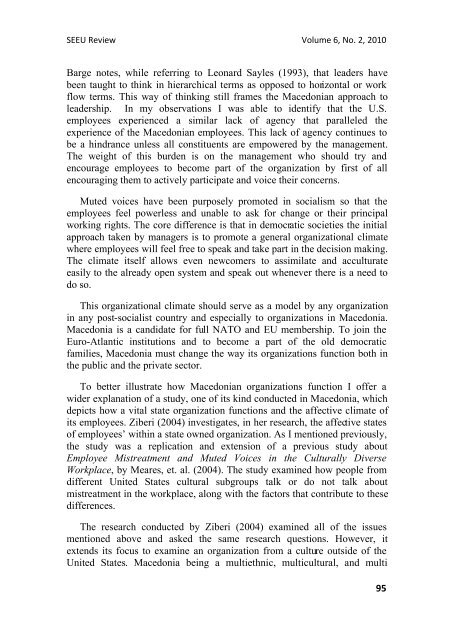SEEU Review vol. 6 Nr. 2 (pdf) - South East European University
SEEU Review vol. 6 Nr. 2 (pdf) - South East European University
SEEU Review vol. 6 Nr. 2 (pdf) - South East European University
You also want an ePaper? Increase the reach of your titles
YUMPU automatically turns print PDFs into web optimized ePapers that Google loves.
<strong>SEEU</strong> <strong>Review</strong> Volume 6, No. 2, 2010Barge notes, while referring to Leonard Sayles (1993), that leaders havebeen taught to think in hierarchical terms as opposed to horizontal or workflow terms. This way of thinking still frames the Macedonian approach toleadership. In my observations I was able to identify that the U.S.employees experienced a similar lack of agency that paralleled theexperience of the Macedonian employees. This lack of agency continues tobe a hindrance unless all constituents are empowered by the management.The weight of this burden is on the management who should try andencourage employees to become part of the organization by first of allencouraging them to actively participate and voice their concerns.Muted voices have been purposely promoted in socialism so that theemployees feel powerless and unable to ask for change or their principalworking rights. The core difference is that in democratic societies the initialapproach taken by managers is to promote a general organizational climatewhere employees will feel free to speak and take part in the decision making.The climate itself allows even newcomers to assimilate and acculturateeasily to the already open system and speak out whenever there is a need todo so.This organizational climate should serve as a model by any organizationin any post-socialist country and especially to organizations in Macedonia.Macedonia is a candidate for full NATO and EU membership. To join theEuro-Atlantic institutions and to become a part of the old democraticfamilies, Macedonia must change the way its organizations function both inthe public and the private sector.To better illustrate how Macedonian organizations function I offer awider explanation of a study, one of its kind conducted in Macedonia, whichdepicts how a vital state organization functions and the affective climate ofits employees. Ziberi (2004) investigates, in her research, the affective statesof employees’ within a state owned organization. As I mentioned previously,the study was a replication and extension of a previous study aboutEmployee Mistreatment and Muted Voices in the Culturally DiverseWorkplace, by Meares, et. al. (2004). The study examined how people fromdifferent United States cultural subgroups talk or do not talk aboutmistreatment in the workplace, along with the factors that contribute to thesedifferences.The research conducted by Ziberi (2004) examined all of the issuesmentioned above and asked the same research questions. However, itextends its focus to examine an organization from a culture outside of theUnited States. Macedonia being a multiethnic, multicultural, and multi95
















